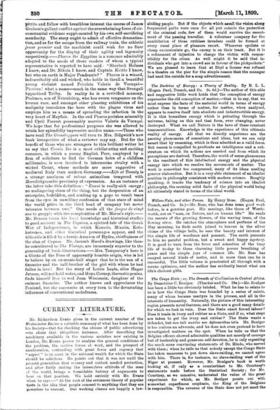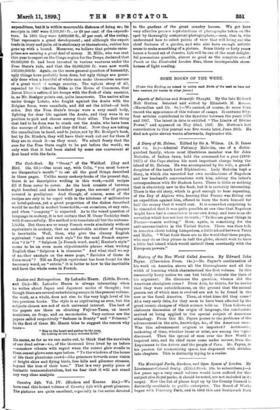The Congo State ; or, The Growth of Civilisation in
Central Africa. By Demetrius C. Boulger. (Thacker and Co. 15s.)—Mr. Boulger has been a little too obviously briefed. What he has to relate to us is how the Congo State was founded by a series of saints, many of whom became martyrs in the process, and all in the interests of humanity. Naturally, the picture of this interesting region presents novel features, and there are a good many details for which we look in vain. Does the State exact forced labour ? Does it trade in ivory and rubber as a State, and if so, what steps are taken to get the ivory and rubber ? The State wants a defender, but non tali auxilio nec defensoribus istis. Mr. Boulger is too zealous an advocate, and he does not even pretend to have investigated matters on the spot. When he tells us that the Belgian officers showed admirable qualities not merely of courage but of leadership and generous self-devotion, he is only repeating the much more convincing statements of Dr. Hinde, who served with them ; when he tells us that nobody except the Congo State has taken measures to put down slave-raiding, we cannot agree with him. There is, for instance, no slave-raiding west of the Niger at present. However, Mr. Boulger's book is worth looking at, if only as a counterblast to Mr. Courtney's statements made before the Statistical Society ; for Mr. Courtney, as we conceive, underrated the value of the great experiment for which, as Mr. Boulger points out with somewhat superfluous emphasis, the King of the Belgians is responsible. The revenue of the State does not yet meet the expenditure, but it is within measurable distance of doing so; its receipts in 1897 were 9,183,360 fr., or 68 per cent. of the expendi- ture. In 1895 they were 3,600,000 fr., 47 per cent. of the outlay. That represents a great development ; and although the export trade in ivory and palm oil is stationary or thereabouts, rubber has gone up with a bound. Moreover, we believe that private enter- prises are earning a great deal of money. M. Mille, who was sent this year to report on the Congo region for the Temps, declared that 60,000,000 fr. had been invested in various ventures under the Free State's rule, and that the 60,000,000 fr. were now worth 150,000,000 fr. Again, on the more general question of humanity, ugly things have probably been done, but ugly things are gener- ally done when a handful of white men make themselves masters of a great tract of savage country. The ugliest story of all, repeated by Sir Charles Dilke in the House of Commons, that Baron Dhanis rationed his troops with the flesh of slain enemies, is, as Mr. Bonlger points out, quite inaccurate. The native allies under Gongo Lutete, who fought against the Arabs with the Belgian force, were cannibals, and did eat the killed—of both sides. But the Free State's troops were a very small body, fighting for dear life against the Arabs, and they were in no position to pick and choose among their allies. The first thing that had to be done was to crush out the Arabs, who have been the scourge of Africa ; and they did that. Now they are taking the cannibalism in hand, and to judge, not by Mr. Boulger's book, but by Dr. Hinde's, they will have their work cut out for them if they are to check it —as they must. We admit freely that the case for the Free State ought to be put before the world ; we only wish that it had been stated by some one conversant at first hand with the facts.







































 Previous page
Previous page